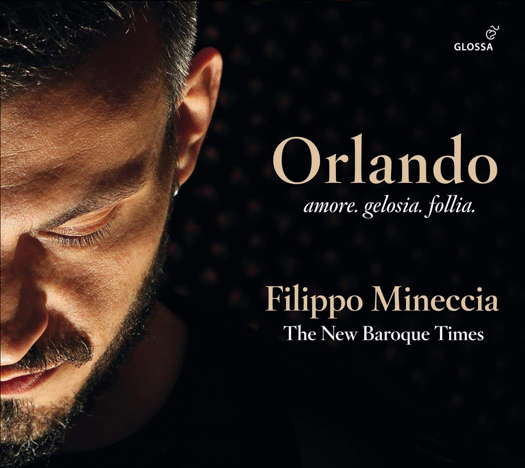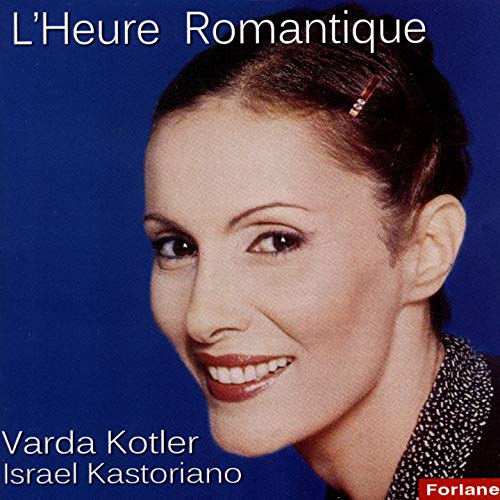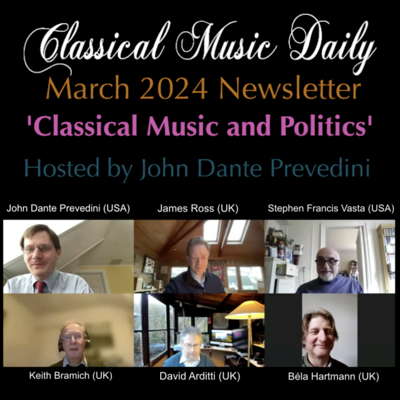- David Craighead
- Gwyneth George Award
- Strauss
- Czerny
- Nicolae Brânduş
- Moment musical
- Augusta Read Thomas: Plea for Peace
- Columbia University

Love, Jealousy and Madness
Music inspired by Ariosto's poem 'Orlando Furioso', heard by GERALD FENECH
'Filippo Mineccia sings with an exceptional timbre that is sensual and luminous, mixing virtuosity with sensitivity, while Pablo Garcia and his ensemble give sympathetic support with their insightful playing.'
You may beg to differ, but to my mind the real protagonist of this recording is the great fifteenth century Italian poet Ludovico Ariosto (1474-1533), and not the composers included in the programme. And I give the reason why, to support my statement. Published in 1516 and appearing at the same time as In Praise of Folly by Erasmus, The Prince by Macchiavelli and Utopia by Thomas More, the immense and sweeping epic poem Orlando Furioso by Ariosto took the then literary world by storm. Indeed, its allure and popularity has hardly dwindled, and the far-ranging human drama it relates still has the power to stir the imagination of the reader to unthinkable levels.
The paladin Orlando, nephew of Charlemagne, falls in love with the beautiful Chinese princess Angelica. However, he is driven raging mad when he discovers that she loves the Saracen soldier Medoro. As the story unfolds through forty-six inspired canti, we come across Ruggiero, Orlando's cousin, who is enchanted by the sorceress Alcina, but who is eventually liberated from the island where she had him incarcerated. The reader is also regaled by the extravagant celebrations of Ruggiero's wedding to Bradamante, a female Christian knight. As one can surmise, Orlando Furioso consists of a tangled succession of interrelated heroic adventures, spiced up by amorous encounters sometimes reciprocated, at other times unshared, variously involving Orlando-Angelica-Medoro, Alcina-Ruggiero-Bradamante, Ariodante-Ginevra-Polinesso and Olympia and Bireno. The end result of all this intrigue: an indisputable contribution to the evolution of European thought.
No wonder then, that this supreme poetic masterpiece fired an ardent desire in the composers that followed Ariosto's death, to set episodes from this epic to music. And that is what this album is all about. All the pieces have as subject matter, obviously, some tale or another from this gigantic narration, but these are taken from three musical genres: operas, serenatas and cantatas. The composers on show are a mixture of famous and not so famous names, but they all share three common passions, which are Orlando's love, jealousy and madness - the disc's title.
Listen — Nicola Porpora: Ombre amene (L'Angelica)
(track 4, 1:24-2:20) © 2020 note 1 music gmbh :
For record purposes I am earmarking the list of those whose music enriches this wonderful undertaking: Agostino Steffani (1654-1728), Nicola Porpora (1686-1768), Antonio Vivaldi (1678-1741), Georg Frederich Handel (1685-1759), Giovanni Battista Mele (1693 or 1701-after 1752), Georg Christoph Wagenseil (1715-1777) and Giuseppe Millico (1737-1802).
Listen — Antonio Vivaldi: Nel profondo cieco mondo (Orlando furioso)
(track 7, 0:00-0:57) © 2020 note 1 music gmbh :
Many people still harbor the idea that baroque opera can be undramatic, but this recording proves that this is quite the opposite. Indeed, this is music that oozes poignancy, pain and despair. Filippo Mineccia sings with an exceptional timbre that is sensual and luminous, mixing virtuosity with sensitivity, while Pablo Garcia and his ensemble give sympathetic support with their insightful playing.
Listen — Georg Christoph Wagenseil: Ombra cara (Ariodante)
(track 13, 2:31-3:17) © 2020 note 1 music gmbh :
A little advice. Do read the exceptionally detailed annotations before you listen. It will help you no end to enjoy this superb issue full of unmitigated splendor.
Copyright © 3 November 2020
Gerald Fenech,
Gzira, Malta

CD INFORMATION: ORLANDO - AMORE, GELOSIA, FOLLIA
FURTHER INFORMATION: AGOSTINO STEFANI
FURTHER INFORMATION: NICOLA PORPORA
FURTHER INFORMATION: ANTONIO VIVALDI
FURTHER INFORMATION: GEORGE FRIDERIC HANDEL
FURTHER INFORMATION: GLOSSA MUSIC




